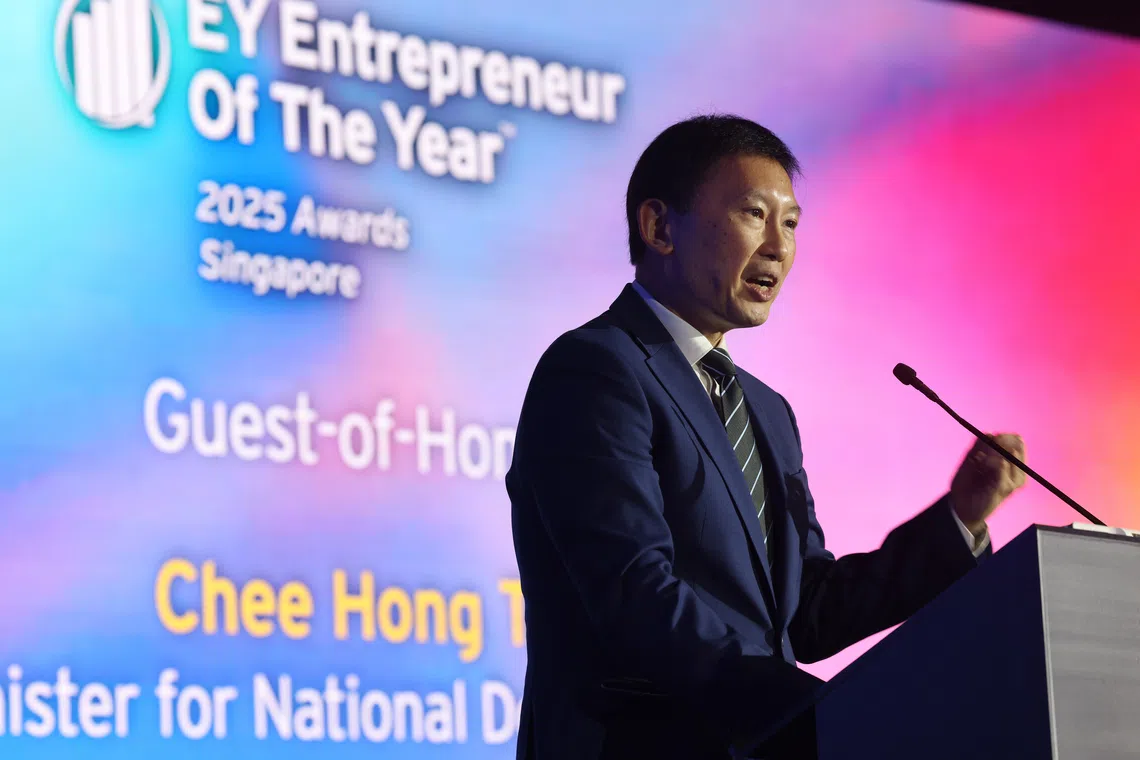HMI Medical group CEO Chin Wei Jia named EY Entrepreneur of the Year 2025 Singapore
She will represent the country at the prestigious EY World Entrepreneur of the Year award in June next year

[SINGAPORE] Chin Wei Jia, group chief executive officer of healthcare provider HMI Medical, has been named EY Entrepreneur of the Year (EOY) 2025 Singapore.
Having also won in the healthcare category, she beat three other EOY category winners to claim the top honour on Friday (Oct 17).
Chin will represent Singapore at the prestigious EY World Entrepreneur of the Year award in June next year, where she will compete with global contenders.
“For me, entrepreneurship has always been about serving with purpose and using business as a force for good. At the heart of it, it is about people and the communities we build together,” Chin said.
Lee Chuan Teck, executive chairman of Enterprise Singapore and chairperson of the judging panel, said HMI transformed from a two-hospital group into a regional integrated healthcare group under Chin’s charge.
“Wei Jia differentiated with her visionary leadership in steering a second-generation business transformation through bold corporate and ecosystem strategies, and a purpose to drive change for a more sustainable future of healthcare,” he said.
Navigate Asia in
a new global order
Get the insights delivered to your inbox.
“HMI’s strategic focus on preventive health, health tech and community outreach reflect her pursuit of innovation, democratising accessibility to private healthcare services, while empowering communities to take responsibility for health.”
Lee added that the four winners, whether they are founders or second-generation business owners, helm home-grown brands that have “thrived through times of change and economic uncertainties”.
Among them, Patrick Cheo, CEO of Adam Khoo Learning Technologies Group, won the education services category; Kelvin Lim, executive chairman and executive director and group managing director of LHN Group, took the award for real estate; and Carolyn Choo, CEO and managing director of Worldwide Hotels, clinched the hospitality services award.
Lee said they demonstrated “exceptional entrepreneurial grit, innovation and resilience in not just overcoming challenges, but transforming their businesses through decisive strategies and seizing breakthrough opportunities”.

Speaking at the awards ceremony on Friday, Minister for National Development Chee Hong Tat said the winners have shown how home-grown businesses can do well in Singapore and reach beyond its shores.
He said entrepreneurs play an important role not just in shaping their industries but also society, through the values that guide their businesses.
They also contribute to strengthening Singapore’s business ecosystem by mentoring others, investing in startups, as well as building networks and partnerships with other businesses and various parts of the ecosystem.
On its part, supporting companies and helping businesses to do well is a key priority for the government, said Chee.
Beyond the provision of grants and incentives, it is also critical for the government to provide a pro-enterprise environment for businesses to flourish, he added.
This includes streamlining rules and processes to help companies save time and costs.
One change that the Urban Redevelopment Authority (URA) will introduce is to make it easier for business owners to set up land-based solar farms.
From Oct 31, those who want to develop solar farms on state land would only need to obtain consent from the agency landowner without having to get separate approval from URA.
This would save the applicant S$3,500 and a month of waiting time.
Additionally, the Ministry of National Development will make the Limitation of Liability clause a mandatory provision in the Standard Consultancy Agreements from Dec 1.
He noted that some consultants for the built environment sector had raised concerns that the government’s contracts did not specify limits on their contractual liability.
They felt that this unlimited liability was rather unfair to them, and they faced challenges in purchasing professional indemnity insurance to cover their potential liability claims.
Chee said the change would allow for more effective and equitable risk-sharing between the government agencies and the industry.
Meanwhile, the government is also looking to provide more financial assurance to contractors for public housing projects, said Chee.
To further ease their cashflow, HDB will be raising the proportion of the initial payments within the contract sum to 5 per cent, from the current 2 per cent, for its building projects, and extending this approach to other contract types by the first quarter of next year.
He said the move would especially benefit smaller contractors that may not have the financial reserves that larger industry players hold.
Decoding Asia newsletter: your guide to navigating Asia in a new global order. Sign up here to get Decoding Asia newsletter. Delivered to your inbox. Free.
Copyright SPH Media. All rights reserved.


